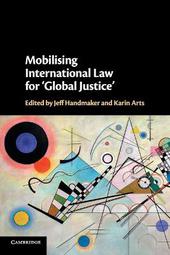
|
Mobilising International Law for 'Global Justice'
Paperback / softback
Main Details
| Title |
Mobilising International Law for 'Global Justice'
|
| Authors and Contributors |
Edited by Jeff Handmaker
|
|
Edited by Karin Arts
|
| Physical Properties |
| Format:Paperback / softback | | Pages:264 | | Dimensions(mm): Height 150,Width 230 |
|
| Category/Genre | World history
Social and political philosophy |
|---|
| ISBN/Barcode |
9781108466080
|
| Classifications | Dewey:341 |
|---|
| Audience | | Professional & Vocational | |
|---|
| Illustrations |
Worked examples or Exercises; 2 Halftones, black and white
|
|
Publishing Details |
| Publisher |
Cambridge University Press
|
| Imprint |
Cambridge University Press
|
| Publication Date |
26 November 2020 |
| Publication Country |
United Kingdom
|
Description
Mobilising International Law for 'Global Justice' provides new insights into the dynamics between politics and international law and the roles played by state and civic actors in pursuing human rights, development, security and justice through mobilising international law at local and international levels. This includes attempts to hold states, corporations or individuals accountable for violations of international law. Second, this book examines how enforcing international law creates particular challenges for intergovernmental regulators seeking to manage tensions between incompatible legal systems and bringing an end to harmful practices, such as foreign corruption and child abduction. Finally, it explores how international law has local resonance, whereby, for example, cities have taken it upon themselves to give effect to the spirit of international treaties that national governments fail to implement, or even may have refused to ratify.
Author Biography
Jeff Handmaker is a senior lecturer at the International Institute of Social Studies in The Hague, which forms part of Erasmus Universiteit Rotterdam. In 2017, he was a visiting research fellow in the Department of Sociology at Princeton University, New Jersey. He is also a senior research fellow of the Faculty of Law at the University of the Witwatersrand in Johannesburg and Editor-in-Chief of the South African Journal on Human Rights. He formerly worked as a practitioner in over fifteen countries, particularly in Southern Africa, Europe and the Middle East as well as with the United Nations and the African Commission on Human and Peoples' Rights. As a socio-legal scholar, his research on legal mobilization explores the social and political dimensions of instrumentalising international law in relation to a variety of contexts and themes Karin Arts holds a professorial chair in international law and development at the International Institute of Social Studies in The Hague, which forms part of Erasmus Universiteit Rotterdam. She sees and studies international law as a major factor in processes of development and/or transition, either as an instrument of change or as a vehicle for guarding the status quo. Human rights-based approaches to development, and in particular child rights-based approaches to development, are central in her recent work. Besides having ample teaching and research experience, she has professional experience in nearly twenty countries, and she advises the Dutch government and parliament on human rights matters (through the Advisory Council on International Affairs). She is also a member of the Supervisory Board of the National UNICEF Committee of the Netherlands.
Reviews'... very well researched, tightly argued, and refreshingly coherent ... This volume is clearly intended for scholars and more advanced students of international law and relations and will be of most use to those who are well versed in critical legal studies ...' Eric A. Heinze, H-Diplo 'The chapters showcase a diverse range of topics and methodologies. Through a series of case studies, the book aims to provide a number of strategies for these actors to realise the goal of preventing impunity for breaches of international law. In doing so, the book illustrates that it is possible for civil society and international lawyers to effect positive change in State-centric international legal institutions ... The question of whether human rights change within a State is 'top-down' from international institutions or 'bottom up' from a mobilized society is one that international lawyers often contemplate. This book shows that under certain circumstances, it is possible for civil society to re-describe the issue to achieve some form of international justice, and that in order to do so, international law must couple with other areas, including international politics. Ultimately, this edited collection reminds international lawyers and civil society that instead of calling for reform of international institutions, there are other more effective means of achieving global justice.' Amina Adanan, Journal of Conflict & Security Law (2022)
|